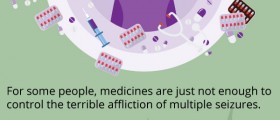
The brain is the most incredible organ in the human body, being at the same time extremely delicate and rather resilient. Although advances in neuroscience have offered many insights into the inner workings of the human brain within the last several decades, and new research continues to pour in all the time, many aspects of the functioning of the human brain remain a mystery to scientists.
The same goes for diseases and abnormalities affecting the brain. Taking into consideration the complexity of this organ, there are many things which can make it dysfunctional. Since the brain is responsible for every single thing we do during our existence, any form of dysfunction can be debilitating. One of the most common conditions affecting the brain is epilepsy.
The Brain and Epilepsy
The upper part of the human brain is divided into two parts called the hemispheres. These two parts are connected with countless nerve fibers and each of the two parts is further divided into four lobes, which are in charge of different brain functions, each essential for daily life.
All the messages our brain produces and transfers are sent through neurotransmitters, chemicals created for these purposes. Whenever a person suffers from any kind of a disease of the nervous system, neurotransmitters are affected too. For example, if an individual suffers from Parkinson's disease, the production of the neurotransmitter called dopamine is affected. Also, absence of nerve cells can lead to the development of conditions such as epilepsy, especially if the lack of oxygen in the hippocampus appears and lasts for a longer period of time.
There are many possible theories which relate epilepsy to different problems within the brain. One of the most reputable ones holds that epilepsy appears once an imbalance between excitatory neurotransmitters, the ones that are responsible for increasing electric activity, and inhibitory neurotransmitters, those which inhibit the activities of brain cells, appears. Basically, if a single type of neurotransmitter is not active enough, the other type will become excessively active, leading to this imbalance and the symptoms of epilepsy.
So, most health experts involved in the treatment of epilepsy try to establish a balance in the activities of a patient's neurotransmitters. Simply, the less uncontrolled activities appear in the brain, the smaller the chances of seizures are.
People who suffer from epilepsy can often notice some mental signs of an oncoming seizure. Increased irritability, mood swings, bad temper, depression or some completely different behavioral changes, all can signify such occurrences. These abnormalities may last anywhere from a couple of minutes to several days.
Yet, a person's consciousness is affected only during the seizures themselves, in most cases. Usually, the warning signs of an epileptic seizure can help people get into a safe environment and avoid getting hurt by the uncontrollable movements they may experience during a seizure.
Sometimes, hallucinations may be a warning signs for epilepsy, too.
Epilepsy and Hallucinations
The most common type of epilepsy that was found to be related to hallucinations is the temporal lobe form of epilepsy. The effects of this form of the condition usually manifest through symptoms which resemble schizophrenia. These symptoms are connected to people who have had epileptic seizures for more than 15 years.
When hallucinations related to epilepsy appear, the affected individuals feel as if they are being persecuted, and may see things which are not actually present.
Alternatively, people who suffer from epilepsy may develop auras before their seizures appear. These hallucinations commonly resemble a dream, often being similar. For these reasons, people who experience them can remember them and understand the auras as the premonitions of convulsions and other signs of seizures typical for epilepsy. In fact, auras themselves are seizures, taking place on a level too small to affect a person's consciousness in a more obvious way.
Hallucinations related to epilepsy can lead to many related negative outcomes. That is, individuals who do not know that they suffer from this condition may think that the hallucinations are a sign of them going mad. Therefore, people often keep such symptoms a secret, being afraid that the others may consider them crazy.
Apart from hallucinations, epileptics may experience some symptoms once the seizure ends. Namely, during this post-seizure period they might be irritable and prone to inappropriate behavior. Moreover, some individuals may even leave the house in their night gowns.
For these reasons, epileptic patients who show such symptoms are usually treated with psychopharmacological medications, along with their regular anti-epileptic therapy.
Taking into consideration that all the mental problems which commonly appear with epilepsy may even lead to contemplations of suicide, this condition should not be neglected nor kept a secret. Rather, people who suffer from epilepsy should be treated medically as soon as possible. This way, their chances of managing to prevent and control their seizures are bound to increase.
In summation, most medical experts connect epilepsy with an imbalance between different neurotransmitters in the brain, triggering seizures and various other symptoms that may warn of an upcoming seizure or occur in its aftermath. Hallucinations can be seen as one of the most radical side effects of epilepsy, making patients feel strange and leading to the development of symptoms similar to schizophrenia.
People who have epilepsy and believe or know that they are experiencing hallucinations of any type are advised to seek medical treatment immediately.
















Your thoughts on this
Loading...